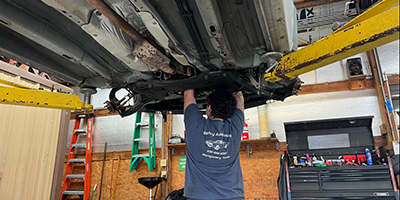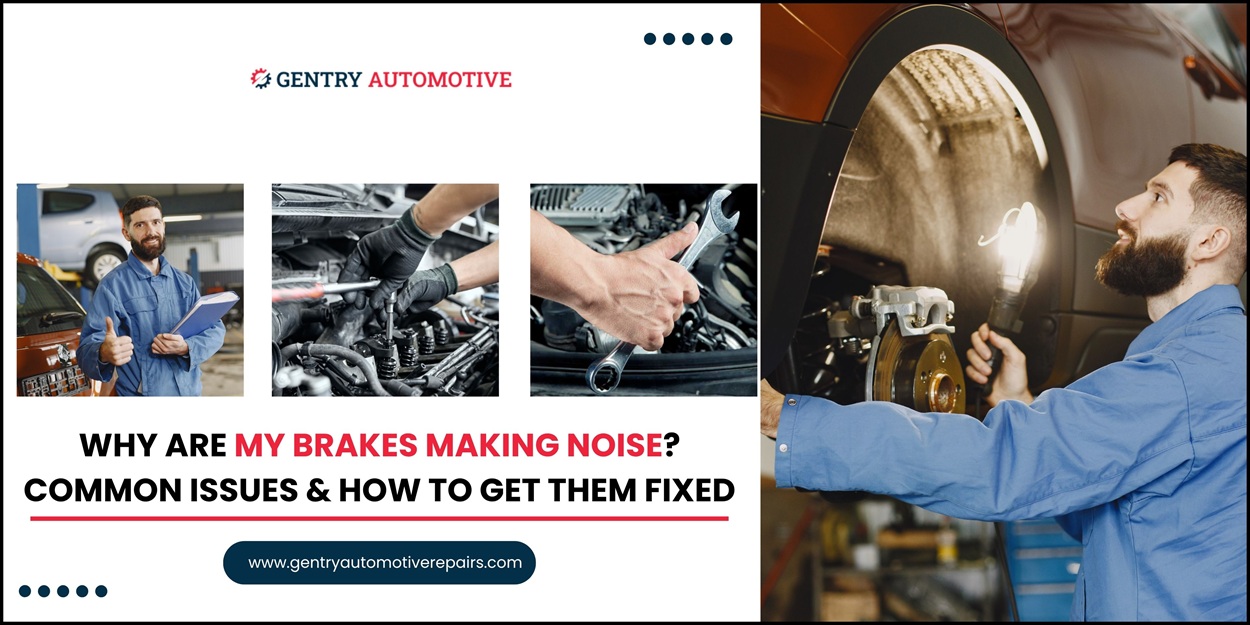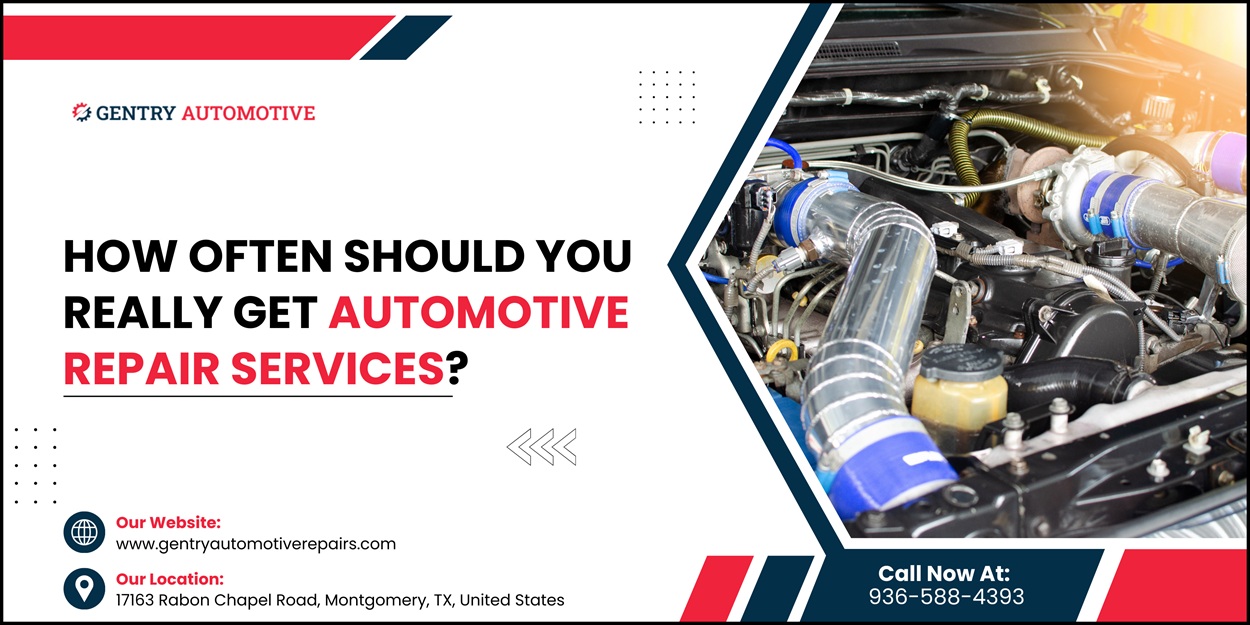When your brakes start making weird noises, it’s not just annoying, it’s terrifying. That high-pitched squeal, the grind, the thump? It’s your car crying for help. If you ignore it, you’re not just risking a pricey repair, but you’re also risking your life and everyone else’s on the road.
So why are your brakes making noise? What’s behind the squeaking, grinding, or slowed brakes? And most importantly, how do you fix it before it wrecks your wallet or worse, your car? This guide breaks down the most common reasons your brakes sound weird and why you need a professional automotive expert to help.
What Causes Your Car Brakes to Make Noise? 6 Common Issues
Worn-Out Brake Pads
This is a major cause. Brake pads wear out over time, it’s pretty normal, there is nothing you can do to avoid it. But once they’re too thin, a little metal tab (called a “wear indicator”) hits your brake rotor and creates that high-pitched squeal. That’s the time you need new pads for your car.
You can fix it by heading to a reliable automotive service center and getting those brake pads replaced ASAP. It’s a quick job, and way cheaper than replacing your entire braking system.
Metal-on-Metal Grinding
This is the next phase that happens if you’ve ignored the squealing for too long. That squealing has now progressed to grinding. That sound means your brake pads are gone, and now metal is grinding against metal.
Why it’s bad: You’re damaging your brake rotors, which we are referring to as those shiny discs behind your wheels. If this continues, you’ll need a full-blown brake repair, not just a pad replacement. To fix it, you may need new pads, rotors, and possibly calipers. A professional automotive expert can inspect it and give you the real damage report.
Brake Dust & Debris
Sometimes, your brakes are noisy because they’re dirty (literally). Brake dust, grime, and even tiny rocks can get caught between the pad and rotor.
All it needs is a quick clean at your local automotive service center to solve this. If you’re already going in for an oil change in Montgomery, have them check your brakes while they’re at it.
Glazed Brake Pads or Rotors
Ever smelled something burning after a hard brake? That could be glazing. This happens when brake pads or rotors overheat and develop a hard, shiny surface. That reduces friction which is also the stopping power of the brakes and creates squealing or screeching sounds.
Now, light glazing might be fixable with resurfacing. But if it’s severe, you’ll need replacements. Do not make the mistake to DIY this, let a certified automotive expert handle it.
Loose or Missing Hardware
Sometimes, your brakes rattle, clunk, or thump. This is not the same as squealing. That often means something’s loose. Clips, bolts, or calipers might be wiggling when they shouldn’t.
This is the time to get a brake inspection. An experienced mechanic will know what’s missing and tighten it down before your wheel decides to part ways with your car.
Worn Shims or Anti-Rattle Clips
Brake shims and clips reduce vibration and noise. If they’re worn or improperly installed, your brakes will sound like terrible metal music. What you need to do is to have them replaced. It’s a minor part with major consequences if ignored.

Should You DIY Brake Repair?
Could you change your brake pads? Maybe. Should you? Probably not. Unless you’re trained, there are plenty of things that could go wrong, you could easily:
- Install them wrong
- Miss signs of rotor damage
- Forget to lubricate key parts
- Create a bigger, more dangerous problem
Brakes aren’t a “watch a 5-minute YouTube video and wing it” kind of thing. Leave it to an expert who knows what they are doing.
When Is the Correct Time to Get a Brake Inspection?
You should book a brake inspection if you notice:
- Any kind of noise while braking
- Longer stopping distances
- The brake pedal feels soft or goes to the floor
- The car pulls to one side when braking
- A burning smell after braking
- The brake warning light is on
Ignoring these signs can turn a $150 repair into a $1500 disaster. Or worse.
Combine Your Brake Check with Routine Service
Here’s a smart tip: pair your brake inspection with routine services like an oil change or getting your flat tire repaired. Most top-rated automotive service centers will inspect your brakes for free or at a discount while your oil’s being changed.
How to Choose the Right Automotive Service Center?
Not all mechanics are created equal. Here’s what to look for:
- Certified Experts on Staff: You want technicians who know what they’re doing. Look for certifications and real customer reviews.
- Upfront Pricing and Diagnostics: A solid service center will explain what’s wrong and will give you a written estimate before beginning.
- Good Reviews and Local Reputation: Look for reviews mentioning honesty, quality, and follow-up care.
- Full-Service Capability: You want a one-stop shop with a team that can handle your Automotive Brake Repair, oil change, tire rotations, and check engine lights all in one place.
- No High-Pressure Sales Tactics: A trustworthy expert won’t push unnecessary services just to pad the bill. A good service center focuses on what you need, not what boosts their margins.
Don’t just search “cheapest mechanic.” You want safe, not sketchy.
Final Thoughts: Brake Problems Don’t Fix Themselves
Brake noise isn’t just annoying. It’s a warning. When your car starts squealing, grinding, or rattling, it’s time to stop pretending everything’s fine. Whether it’s worn pads, warped rotors, or just buildup from driving through gunk, your brakes need professional attention, and that too fast.
Visit a trusted automotive service center, talk to an automotive expert, and stop rolling the dice with your safety. Your brakes are the only thing standing between you and the bumper of the car in front of you. So, don’t gamble. If your brakes are making noise, shaking, or just feel “off”, get them looked at now.



